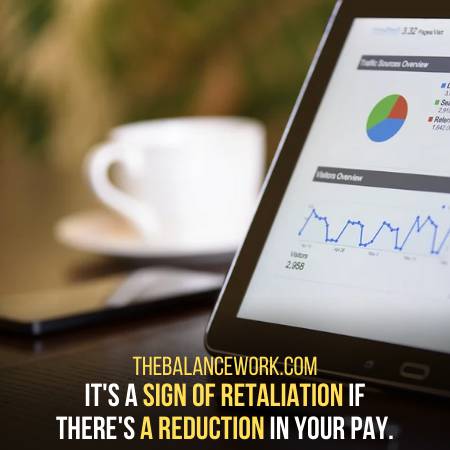Employers all around the world are free to decide whom to hire and how much to pay. When to terminate, promote or demote an employee is also their decision.
At-will employees can get terminated by their employers without a just cause.
But it’s not right to retaliate against the employee for involving in legal actions. What’s retaliation in the workplace, and how can one prove it?
Your answers are here in this article. So keep reading for a better understanding.
How To Prove Retaliation In The Workplace – 6 Clear Signs
Retaliation is one of the alleged types of discrimination in the workplace. It happens when an employer punishes his employee for doing something legal.
In such cases, one should carefully consider the circumstances of the situation. For instance, many employees won’t mind a change in their job shift.
However, it can be disturbing to parents having small children at home. It’s illegal retaliation when the employer’s actions stop a person from making complaints.
But these signs of retaliation make it more evident that you’re getting pushed aside by your boss.
1. Demotion Is A Sign Of Retaliation
The boss puts you in a lower-ranking position. You lose your responsibilities and privileges related to seniority.

This losing of status and getting to a lower position is an act of retaliation.
2. How To Prove Retaliation In The Workplace – Terminating Or Firing
A severe action of retaliation is you may get terminated or fired from your position.
So your employer doesn’t seem to have a practical reason, but he fires you anyway.
3. Salary Reduction
If you’re getting a pay cut or you’re losing your regularly scheduled work hours.

It’s pretty evident that you’re facing retaliation in the workplace.
4. Job Or Shift Reassignment Is A Clear Sign
Getting to face a reassignment in your duties is also retaliation. And your responsibilities are unnecessarily scheduled in a way that causes difficulty.
5. How To Prove Retaliation In The Workplace – Exclusion
You get a sudden exclusion from important meetings. Your boss doesn’t involve you in staff meetings or training.

So this differential treatment of not getting involved in retaliation.
6. Negative Performance Review
An unexpected negative performance review is also a sign of retaliation. You performed well, and you expect a good review, but the tables get suddenly turned.

Some of the other everyday retaliation actions are warnings and performance improvement plans. They do so to prepare the plan for your eventual termination.
Also, mentioning that your performance is insufficient to keep the promotion you deserve.
How To Prove Retaliation In The Workplace – Protected Rights
The rights protected according to the laws of the state are said to be the protected rights of a person.
So have a look at some of these rights you have working under an employer.
1. It’s your right to complain against wrongful retaliation, discrimination, and harassment. It can be either you or your coworker facing these situations. It’s possible to complain on someone else’s behalf.
2. Reporting unsafe working conditions is a fundamental right of every employee.
3. It’s a legal right of an employee to resist unwanted sexual advances at the workplace.

4. You can claim compensation if you suffered a workplace injury.
5. Refusal to follow any discriminatory orders is also a protected right.
6. You can take protected and unpaid leave under severe personal issues.
7. It’s a legal right to demand some accommodation related to religious or disability purposes.
8. You are free to be a witness if a discrimination case gets filed against an employer.
The Process For How To Prove Retaliation In The Workplace
While complaining about retaliation, the difficulty will be to prove that retaliation occurred.
Although it’s easier to prove that you got fired or discriminated against. But how will you confirm that the actions were retaliatory in nature?
For this, you’ll have to develop the following three things.
1. Your Engagement In A Protected Activity
The most important thing you’ll have to prove is a bit easy compared to the rest of the process. You’ll get required to prove that you were engaged in some kind of protected activity.

You must do not do anything that’s against the law.
2. A Harsh Workplace Action Got Taken Against You
One more thing you’ll be proving is your employer took workplace-related action against you.
It can be one of the actions that were retaliatory in nature and enlisted above or something else.
3. The Nature Of The Action Was Retaliatory
It won’t be enough to prove your engagement in a protected activity or actions opposing you.
You’ll have to prove the connection between these two events.

There are things that back this connection if there are not enough fair explanations. Like why an employer will terminate someone without a fair reason?
The time and gap between the said two can also be helpful. For instance, you got fired right after presenting the testimony of an employer’s discrimination. Your employer’s know-how about your doings also plays an important role here.
For instance, if you’re unable in proving that your boss was aware of your activity. You can’t prove that the action he took was retaliatory because of his awareness.
Taking Help From An Employment Law Attorney
It can be stressful and intimidating to exercise even your fair rights. Because you might already face discrimination or harassment.
In such a case, when the boss takes an action against you, it’s natural to get scared.
But the good part is that you won’t be alone in doing so. You can consult a lawyer who has a broad knowledge of workplace laws. He’ll assist you by offering the guidance you need.
A lawyer can help you by:
1. How To Prove Retaliation In The Workplace – Investigating The Case
Your lawyer will start by collecting the evidence that is important for proving three elements.
It can include records of employment or other data in the possession of your boss.
2. He’ll Represent You While Interacting With The Employer
You won’t be alone in going against your boss, so don’t worry about that.

Your lawyer will represent your interests while interacting with the boss.
3. Your Lawyer Will Explain The Law And The Options
The lawyer will help you in comprehending how to navigate the laws of your state. And he’ll tell you the process of filing a complaint with civil rights.

He might tell you the solutions and be your representative in the court hearings. A lawyer will also help to negotiate a middle way.
If it’s necessary, he might also take the case to court for a trial.
Frequently Asked Questions
What Makes A Strong Retaliation Case?
A strong retaliation case consists of a legally protected activity, adverse employment action. This adverse action can be in the form of firing. Also, you must be able to prove a causal connection between the said two things.
What Is The Average Settlement For A Retaliation Lawsuit?
An average court settlement is about 40,000 dollars. However, 10 percent of discrimination and termination resulted in a one-million-dollar settlement. So the majority of cases get ruled in favor of the plaintiff when they get taken to litigation.
Is Retaliation A Form Of Harassment?
Retaliation is the most alleged basis for discrimination in the federal sector. It's also the most common discrimination finding in most federal cases. Punishing job applicants for exercising their rights is harassment.
How Do You Win A Retaliation Case?
To win a retaliation case, you must show that your employer subjected you to adverse action. It can be due to harassment or discrimination you previously reported. Employees must get protected from retaliation when they report harassment or discrimination.
Conclusion
Facing workplace retaliation is not a new thing. The real deal is to be able to prove retaliation in the workplace.
So if you’re facing workplace retaliation, first of all, consult with an employment lawyer.
Retaliation makes the life of an employee miserable, or it can lead to even job loss. Hence a lawyer will help you to find out the best way to protect yourself.
And you can also negotiate a resolution with your employer with the help of your lawyer.
So please don’t settle for retaliation and take a stand against it.
Leave a comment to share your experience with us.
Last Updated on 3 hours by Shahzaib Arshad
- 7 Great Signs Your Boss Wants to Help You - October 8, 2023
- How To Explain Dropping Out Of Law School? Detailed Guide - September 6, 2023
- 10 Reasons Employees Get Fired in Workplace - August 27, 2023